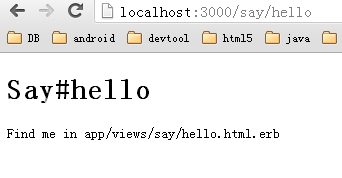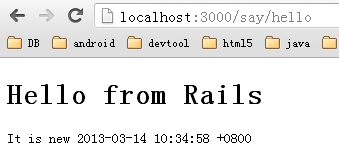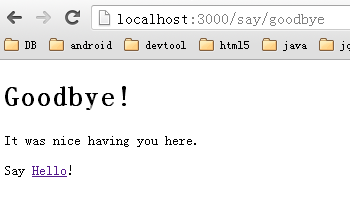一、Windows下rails环境安装
很简单一步搞定。。。
1.下载Rails DevKit:railsinstaller-version.exe 下载地址 http://railsinstaller.org/
railsinstaller-2.1.exe下载地址http://download.csdn.net/download/loveanna7/5147502
2.安装rails:执行railsinstaller-version.exe安装rails。傻瓜式安装(有一点要注意,安装路径不要有空格);其他组件也一并会安装上,包括ruby、gem、bundle等。
3.安装完成后点完成的时候,那个界面的复选框选上的话,我们就要进入git设置。会自动打开终端,只要输入姓名和邮箱会自动配置好。
4.配置完成之后终端会自动进入C:\Sites。我们现在可以查看我们安装的环境的版本号:ruby -v;rails -v;gem -v;bundle -v
运行日志:
# Rails Environment Configuration. Your git configuration is incomplete. user.name and user.email are required for properly using git and services such as GitHub ( http://github.com/ ). Please enter your name, for example mine is: Wayne E. Seguin name > Jarry Li Setting user.name to Jarry Li Please enter your email address, for example mine is: [email protected] email > [email protected] Setting user.email to [email protected] 'clip' 不是内部或外部命令,也不是可运行的程序 或批处理文件。 --- git: user.name: Jarry Li user.email: [email protected] version: git version 1.7.9.msysgit.0 ruby: bin: D:/dev/RailsInstaller/Ruby1.9.2/bin/ruby.exe version: ruby 1.9.3p125 (2012-02-16) [i386-mingw32] rails: bin: D:/dev/RailsInstaller/Ruby1.9.2/bin/rails.bat version: Rails 3.2.1 ssh: public_key_location: C:\Documents and Settings\Administrator/.ssh/id_rsa.pub public_key_contents: ssh-rsa AAAAB3NzaC1yc2EAAAABIwAAAQEAxGnWu+Vl8ZuVbEg21/w2s 4UIOFPK9ujkl2r19Ysq2E94ZSvaPfjJj7PkN0619Ci35BtmAu14ChdFBWPLi8PhrZu5o0PSZao0wecXX v8kcl27iaAIQtnXr9uz3319fZRDgx12V/DBnXD5NFI1BTQJVaPxM6SwblJJCDs/ELgR9Wg0x23t4e33s z0AXkav4kFKbxlJFDXl8vAbauyLozkd28+jFUni8sFau4eDVkv4XVmFBLPAQPb5rSZ8Pmt8ci6Zj2JEX 9rCFr7qPPMiWgSlb2vC3d8S2Lwk+Ju1P/AqiAubemyZnRq25ar0W7Nx+sKjJpHzskthhwZ93UJkaRpxF Q== Jarry Li <[email protected]> NOTES: Your public ssh key (id_rsa.pub) has been automatically generated and copied t o your clipboard. C:\Sites>ruby -v ruby 1.9.3p125 (2012-02-16) [i386-mingw32] C:\Sites>rails -v Rails 3.2.1 C:\Sites>gem -v 1.8.16 C:\Sites>bundle -v Bundler version 1.0.22
二、新建应用程序
1.创建一个demo应用程序:cd到工作目录,如:E:\works\ruby,执行rails new demo,会创建一个名为demo的应用程序
2.cd到demo目录
3.启动自带默认的rails服务器:rails server
4.浏览器打开http://localhost:3000
运行日志:
C:\Sites>cd e:\works\
C:\Sites>e:
E:\works>mkdir ruby
E:\works>cd ruby
E:\works\ruby>rails new demo
create
create README.rdoc
create Rakefile
create config.ru
create .gitignore
create Gemfile
create app
create app/assets/images/rails.png
create app/assets/javascripts/application.js
create app/assets/stylesheets/application.css
create app/controllers/application_controller.rb
create app/helpers/application_helper.rb
create app/mailers
create app/models
create app/views/layouts/application.html.erb
create app/mailers/.gitkeep
create app/models/.gitkeep
create config
create config/routes.rb
create config/application.rb
create config/environment.rb
create config/environments
create config/environments/development.rb
create config/environments/production.rb
create config/environments/test.rb
create config/initializers
create config/initializers/backtrace_silencers.rb
create config/initializers/inflections.rb
create config/initializers/mime_types.rb
create config/initializers/secret_token.rb
create config/initializers/session_store.rb
create config/initializers/wrap_parameters.rb
create config/locales
create config/locales/en.yml
create config/boot.rb
create config/database.yml
create db
create db/seeds.rb
create doc
create doc/README_FOR_APP
create lib
create lib/tasks
create lib/tasks/.gitkeep
create lib/assets
create lib/assets/.gitkeep
create log
create log/.gitkeep
create public
create public/404.html
create public/422.html
create public/500.html
create public/favicon.ico
create public/index.html
create public/robots.txt
create script
create script/rails
create test/fixtures
create test/fixtures/.gitkeep
create test/functional
create test/functional/.gitkeep
create test/integration
create test/integration/.gitkeep
create test/unit
create test/unit/.gitkeep
create test/performance/browsing_test.rb
create test/test_helper.rb
create tmp/cache
create tmp/cache/assets
create vendor/assets/javascripts
create vendor/assets/javascripts/.gitkeep
create vendor/assets/stylesheets
create vendor/assets/stylesheets/.gitkeep
create vendor/plugins
create vendor/plugins/.gitkeep
run bundle install
Fetching source index for https://rubygems.org/
Installing rake (10.0.3)
Installing i18n (0.6.4)
Installing multi_json (1.6.1)
Using activesupport (3.2.1)
Installing builder (3.0.4)
Using activemodel (3.2.1)
Using erubis (2.7.0)
Installing journey (1.0.4)
Installing rack (1.4.5)
Installing rack-cache (1.2)
Installing rack-test (0.6.2)
Using hike (1.2.1)
Installing tilt (1.3.5)
Installing sprockets (2.1.3)
Using actionpack (3.2.1)
Installing mime-types (1.21)
Using polyglot (0.3.3)
Installing treetop (1.4.12)
Installing mail (2.4.4)
Using actionmailer (3.2.1)
Using arel (3.0.2)
Installing tzinfo (0.3.37)
Using activerecord (3.2.1)
Using activeresource (3.2.1)
Using bundler (1.0.22)
Installing coffee-script-source (1.6.1)
Installing execjs (1.4.0)
Using coffee-script (2.2.0)
Installing rack-ssl (1.3.3)
Installing json (1.7.7) with native extensions
Installing rdoc (3.12.2)
Using thor (0.14.6)
Using railties (3.2.1)
Using coffee-rails (3.2.2)
Installing jquery-rails (2.2.1)
Using rails (3.2.1)
Installing sass (3.2.7)
Installing sass-rails (3.2.6)
Installing sqlite3 (1.3.7)
Installing uglifier (1.3.0)
Your bundle is complete! Use `bundle show [gemname]` to see where a bundled gem
is installed.
E:\works\ruby>cd demo
E:\works\ruby\demo>rails server
=> Booting WEBrick
=> Rails 3.2.1 application starting in development on http://0.0.0.0:3000
=> Call with -d to detach
=> Ctrl-C to shutdown server
SECURITY WARNING: No secret option provided to Rack::Session::Cookie.
This poses a security threat. It is strongly recommended that you
provide a secret to prevent exploits that may be possible from crafted
cookies. This will not be supported in future versions of Rack, and
future versions will even invalidate your existing user cookies.
Called from: D:/dev/RailsInstaller/Ruby1.9.3/lib/ruby/gems/1.9.1/gems/ac
tionpack-3.2.1/lib/action_dispatch/middleware/session/abstract_store.rb:28:in `i
nitialize'.
[2013-03-14 10:01:15] INFO WEBrick 1.3.1
[2013-03-14 10:01:15] INFO ruby 1.9.3 (2012-02-16) [i386-mingw32]
[2013-03-14 10:01:15] INFO WEBrick::HTTPServer#start: pid=4728 port=3000
三、Hello Rails
写一个hello world程序试试手,新打开一个终端,并cd到E:\works\ruby\demo
1.用rails生成一个名为say的控制器,用命令:rails generate controller Say hello goodbye
日志信息:
E:\works\ruby\demo>rails generate controller Say hello goodbye
SECURITY WARNING: No secret option provided to Rack::Session::Cookie.
This poses a security threat. It is strongly recommended that you
provide a secret to prevent exploits that may be possible from crafted
cookies. This will not be supported in future versions of Rack, and
future versions will even invalidate your existing user cookies.
Called from: D:/dev/RailsInstaller/Ruby1.9.3/lib/ruby/gems/1.9.1/gems/ac
tionpack-3.2.1/lib/action_dispatch/middleware/session/abstract_store.rb:28:in `i
nitialize'.
create app/controllers/say_controller.rb
route get "say/goodbye"
route get "say/hello"
invoke erb
create app/views/say
create app/views/say/hello.html.erb
create app/views/say/goodbye.html.erb
invoke test_unit
create test/functional/say_controller_test.rb
invoke helper
create app/helpers/say_helper.rb
invoke test_unit
create test/unit/helpers/say_helper_test.rb
invoke assets
invoke coffee
create app/assets/javascripts/say.js.coffee
invoke scss
create app/assets/stylesheets/say.css.scss
2.控制器demo/app/controllers/say_controller.rb代码
class SayController < ApplicationController def hello end def goodbye end end
可以看到是继承了ApplicationController类,里面有两个空的方法。
3.rails的url请求,浏览器访问:http://localhost:3000/say/hello
我们运行rails generate时生成了6个文件1个目录say,这个目录用来存放控制器视图的模板文件,我们创建了say控制器,视图就位于app/views/say中。
默认rails会寻找与当前动力(action)同名的文件中的模板。这里我们修改app/views/say/hello.html.erb模板文件,只要在其中添加HTML代码。
当前代码
<h1>Say#hello</h1> <p>Find me in app/views/say/hello.html.erb</p>
修改之后:
<h1>Hello from Rails</h1>
刷新浏览器可看到:
4.在模板中添加动态内容:每次显示页面时也显示当前时间。
模板文件用.html.erb后缀,是告诉rails,需要借助ERb系统对文件的内容进行扩展,就像jsp/asp/php一样的动态页面文件。ERb是一个过滤器,包含在rails的默认安装里。
修改app/views/say/hello.html.erb模板,添加显示当前时间:
<h1>Hello from Rails</h1> <p> It is new <%= Time.now %> </p>
刷新浏览器:
5.将“获取时间”的方法写在控制器中,视图则只承担显示信息的职责。
对控制器中hello方法进行修改,将时间值放在@time的实例变量中,.html.erb模板中输出实例变量即可。
修改控制器app/controllers/say_controller.rb:
class SayController < ApplicationController def hello @time = Time.now end def goodbye end end
修改app/views/say/hello.html.erb模板:
<h1>Hello from Rails</h1> <p> It is new <%= @time %> </p>
刷新浏览器, 只看到时间更新。
四、把页面连起来
1.创建应用的时候,还创建一个goodbye的动作,对应的模板app/views/say/goodbye.html.erb,现在用得上了,修改它:
<h1>Goodbye!</h1> <p> It was nice having you here. </p>
2.打开http://localhost:3000/say/goodbye
3.把hello和goodbye页面连接起来:现在需要在两个模板页面上添加链接,让其互相跳转。
hello.html.erb添加:
<p> Say <a href="/say/hello">Hello</a>! </p>
goodbye.html.erb添加:
<p> Say <a href="/say/goodbye">Goodbye</a>! </p>
4.现在这样是管用,但是如果把应用程序移到Web服务器的另一个目录下,这些Url就会失效。实际上我们可以使用Rails提供的视图模板中的辅助方法。现在使用辅助方法添加跳转链接。
修改hello.html.erb:
<h1>Hello from Rails</h1> <p> It is new <%= @time %> </p> <p> Time to say <%= link_to "Goodbye", say_goodbye_path %>! </p>
修改goodbye.html.erb:
<h1>Goodbye!</h1> <p> It was nice having you here. </p> <p> Say <%= link_to "Hello", say_hello_path %> again. </p>
link_to()是一个方法(在rails中把这样的方法叫做辅助方法(helper),因为它给编写视图模板带来了便利)。这里使用时省略了圆括号。
say_goodbye_path参数是rails预计算过的一个值。








